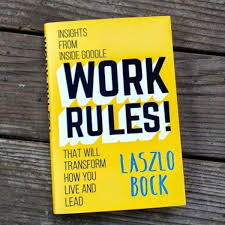Description
A “work rules” book usually includes the guiding principles, policies, and guidelines that will govern the behavior of employees, workplace culture, and organizational structure. One very popular example is Laszlo Bock, former SVP of People Operations at Google, “Work Rules!”. Here’s a quick summary of the major points:
Work Rules! by Laszlo Bock
Theme:
From the book, one can have an idea of how Google changed its practice of HR towards treating its employees well, having a creative environment, and culture with a high-performing attitude.
Key Takeaways:
Hiring Process :
Google deals more in recruiting the right talent. In the hiring process, the sought qualities should be cognitive ability, leadership ability, and the right fit in culture rather than just technical capability.
Employee Empowerment:
Companies will succeed if they can give their employees more space and freedom. Bock believes that there should be a culture that enables employees to make decisions for companies and share ideas without restrictions.
Open Communication:
Transparency and openness shall always prevail. Google encourages open communication among its leaders on company goals, decisions, or even failures, which stimulates trust among team members.
Data-Driven Decisions:
Google has analytical HR because the company puts down a record of some data, which is used in determining employee’s promotion, rewards, and work-life balance. It ensures all its policies are evidence-based.
Work-Life Balance
As much as Google provides most perks, the company emphasizes that they aren’t gimmicks but rather help employees strike a work-life balance so that they can be active at work.
Continuous Learning
Google encourages people to a culture of life-long learning. Bock writes on how the investment one makes in the development of employees should be done through mentorship, training, and providing them with stretch projects.
Creation of an Innovative Work Environment:
The book puts focus on the value that should be attached to workplace culture so that innovation can thrive. Teams are encouraged to take their risks and learn from their failure while ensuring creativity is cultivated.
Fair Pay Consideration:
Rewarding should be fair but not be the prime motivator. According to Bock, intrinsic motivation like having a purpose and passion is a far greater long-term engagement driver than remuneration or money.
Conclusion:
Bock’s philosophy is to facilitate organisations to work places where employees feel worthwhile and are motivated to innovate. Treating staff well by giving them an opportunity to grow can actually lead to business success and employee happiness.
Thus, the book will be of practical use to leaders and HR professionals that seek to replicate Google’s innovative work culture within an organization.










Reviews
There are no reviews yet.